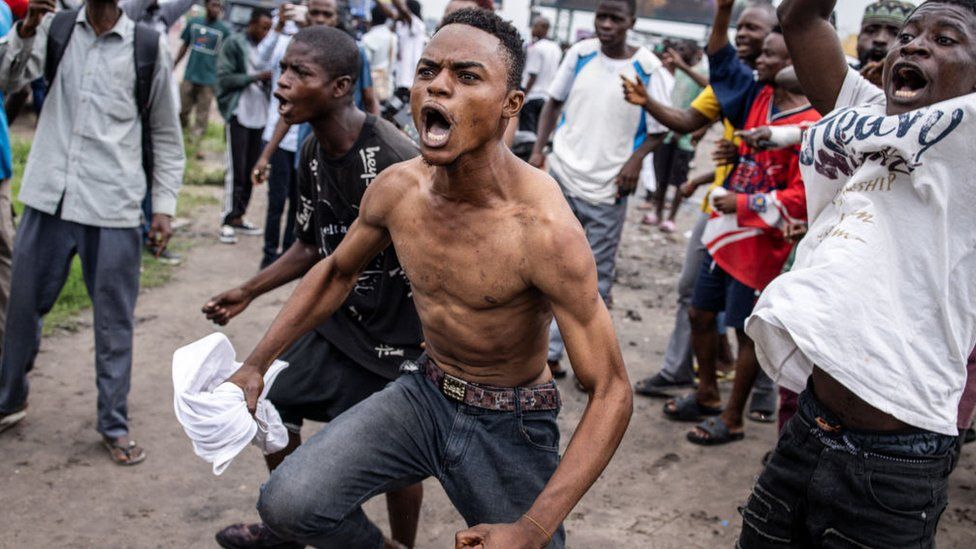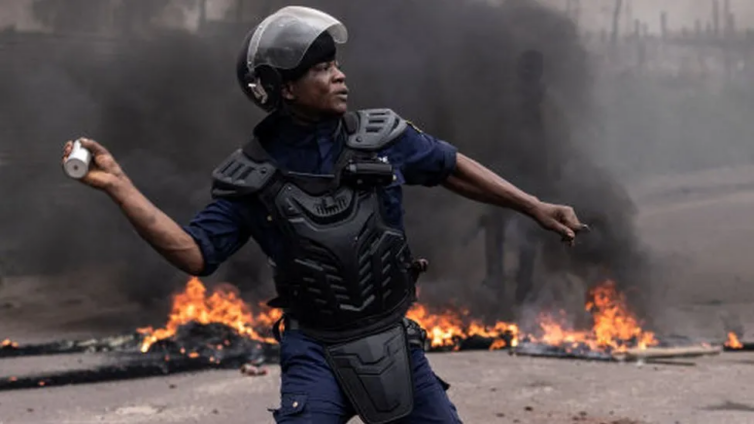
Audio By Carbonatix
Police in the Democratic Republic of Congo have clashed with opposition supporters demanding that last week's presidential poll be annulled.
Leading opposition candidates have denounced the election as a sham and have demanded a rerun.
Several people were wounded as police fired tear gas and threw stones back at protesters in the capital, Kinshasa.
The government banned the protest, saying it would not tolerate attempts to undermine the electoral process.
Election officials have so far not said exactly how many polling stations opened or how many people voted in the 20 December election.
About 44 million people were registered to vote at about 75,000 polling stations.
With just over nine million ballots counted so far, President Felix Tshisekedi is in the lead with almost 80% of the vote as he seeks a second term.
Football tycoon and mining magnate Moïse Katumbi is trailing him with about 16%.
Former oil executive Martin Fayulu, who claims he was robbed of victory in the 2018 election, is in third place with about 4%.
Mr Fayulu's supporters burnt tyres and clashed with police outside his campaign headquarters in Kinshasa.
Police took up positions on key roads in the city and thwarted an attempted march to the headquarters of the electoral commission.
Mr Fayulu said that 11 of his supporters were injured, while police reported two injuries on their side.

GETTY IMAGES
The election was marred by logistical delays and administrative chaos, forcing voting to be extended to a second day in some parts of the country.
The opposition has also accused the electoral commission of orchestrating fraud and ballot stuffing in order to pave the way for Mr Tshisekedi to be declared the winner.
The commission has denied the allegations.
DR Congo is roughly four times the size of France but lacks basic infrastructure. Even some of its main cities are not linked by road.
About two-thirds of the country's 100 million population live below the poverty line, earning $2.15 (£1.70) a day or less.
Voters also chose parliamentary, provincial and municipal representatives, with about 100,000 candidates in total.
The elections were not held in parts of the East because of insecurity.
Dozens of armed groups have been competing to control parts of the region, home to much of the country's vast mineral wealth.
This includes vast reserves of cobalt, a vital part of many lithium batteries, seen as essential to a future free of fossil fuels.
Latest Stories
-
NAIMOS has failed in galamsey fight; it’s time for a state of emergency – DYMOG to President Mahama
3 hours -
Mahama to open African Court judicial year in Arusha, mark 20th anniversary
3 hours -
Ghana begins partial evacuation of Tehran Embassy as Middle East tensions escalate
3 hours -
EPA tightens surveillance on industries, moves to cut emissions with real-time monitoring system
3 hours -
Police conduct show of force exercise ahead of Ayawaso East by-election
5 hours -
Ghana launches revised Early Childhood Care and Development Policy to strengthen child development framework
5 hours -
AI to transform 49% of jobs in Africa within three years – PwC Survey
5 hours -
Physicist raises scientific and cost concerns over $35m EPA’s galamsey water cleaning technology
6 hours -
The road to approval: Inside Ghana’s AI strategy and KNUST’s leadership
6 hours -
Infrastructure deficit and power challenges affecting academics at AAMUSTED – SRC President
6 hours -
Former US diplomat sentenced to life for abusing two girls in Burkina Faso
6 hours -
At least 20 killed after military plane carrying banknotes crashes in Bolivia
7 hours -
UK reaffirms investment commitment at study UK Alumni Awards Ghana 2026
7 hours -
NCCE pays courtesy call on 66 Artillery Regiment, deepens stakeholder engagement
7 hours -
GHATOF leadership pays courtesy call on Chief of Staff, Julius Debrah
7 hours

